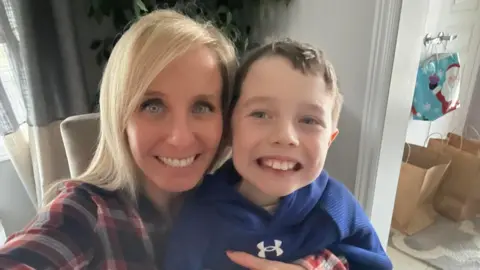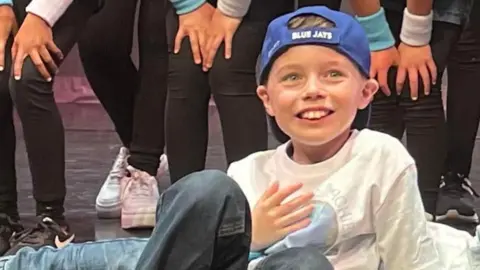 Courtesy Christina Collura
Courtesy Christina ColluraWhen Christina Collura heard President Donald Trump’s announcement linking taking Tylenol during pregnancy to autism, she went down a “rabbit hole”.
The Canadian mom of two boys, including a 12-year-old son with autism, wracked her brain for if she had ever taken paracetamol – the main ingredient in the drug – when she was pregnant with either child.
Just the thought that she may have done something harmful to her baby “played such a mind game”, she said. “It was scary.”
The announcement by President Trump and his administration Monday convulsed through a community who say they are already fighting an uphill battle with society for acceptance and adaptation to their needs and gifts.
“So many moms were going down the rabbit hole and saying, ‘Did you take Tylenol?'” Ms Collura said. “And I’m like, ‘Okay, we’re not going there. We’re not doing this.'”
The majority of researchers and medical bodies say there is not one cause of autism, and that taking Tylenol is safe and remains the best treatment for pain and fever during pregnancy.
Ms Collura especially took issue with Trump’s descriptions of autism as a “horrible, horrible crisis” and increased diagnoses as among the “most alarming public health developments in history”.
“I’ve never looked at my family dynamic as being a disaster or horrendous,” she said. “Do I wish things could change in little spots of our lives? Who doesn’t, but to actually say that children on the spectrum cause that sort of situation. It’s heartbreaking.”
 Courtesy Christina Collura
Courtesy Christina ColluraAdvocates, parents, and particularly those living life on the autistic spectrum told BBC News they are horrified by the president’s remarks and worry about the larger impact on their lives – and their children’s.
Zoe Gross, head of advocacy for the Autistic Self Advocacy Network, a group run by and for autistic people, called it “alarming” and “stigmatising”.
“They were so aggressive in how much they don’t like autism and think it should go away”, she noted, saying she and others with autism took it personally.
Professionally, her organisation is calling for the removal of US Health Secretary Robert Kennedy Jr over unproven claims and misinformation about the disorder.
Amid much fanfare on Monday, Trump and Kennedy announced the administration would issue advice to doctors to use caution when prescribing the pain reliever Tylenol to pregnant women, citing a disputed link between the drug and autism.
They also raised unproven claims linking vaccines and autism that have been widely debunked.
Medical experts have pushed back on the claims. Health officials in the UK have stressed that paracetamol remains the safest painkiller available to pregnant women.
Announcement raises self-doubt
Ms Collura said she remembers taking Tylenol once, but not while pregnant with Luca, who was diagnosed with autism at three.
It’s the self-doubt that is the problem, she told the BBC, sending her into an anxiety spiral.
Ms Collura is battle-tested. When Luca was diagnosed, doctors said if he didn’t speak by six years old, he never would. He didn’t, but he started talking instead as his seventh birthday approached. Now he’s 12 and a chatterbox, she says.
An elementary school teacher in Toronto, Canada, she has seen kids change over 20 years, learning in different ways. She started Creative Beginning, which produces inclusive and educational puzzles for kids, and now advocates on behalf of the autism community.
She believes the increase in autism diagnoses reflects an increase in awareness in the medical community of kids’ changing needs. While the number of people officially diagnosed with autism has risen sharply over the past few decades, most researchers believe that one of the factors for this uptick is increased awareness and testing.
“If we can all switch a little bit and realise this is not a bad thing, it might just be a better perspective,” she said.
‘Exercise their best judgment’
HHS referred the BBC to statements issued earlier this week outlining the administration’s plans and statistics showing 3% of children born in 2014 are diagnosed with autism, a sharp increase since 2000.
The US Food and Drug Administration is taking steps to ensure safety warnings are added to paracetamol labels in addition to issuing the guidance to doctors to “exercise their best judgment in use of acetaminophen for fevers and pain in pregnancy by prescribing the lowest effective dose for the shortest duration when treatment is required”.
The administration also opened the door for the use of folinic acid, or leucovorin, to treat symptoms of autism. The medication is normally given to cancer patients to reduce the side-effects of chemotherapy, and researchers say more study is needed on its uses for autism.
Treading a careful line between the need for research and the fallout described by some in the autistic community, advocacy group Autism Speaks said it welcomes the added focus and investment in autism and urges the administration to dedicate resources “toward advancing new and innovative areas of research, so the community benefits from fresh insights, rather than revisiting questions that have been well studied, including vaccines and autism”.
Improving life with autism
At the Autistic Self Advocacy Network, Ms Gross said the group would like to see the administration invest in research to improve quality of life for people living with autism. For example, investigating alternative communication devices and the best way to teach people how to use them, or developing better or different ways to provide services and support, may be a more helpful approach to autism.
“You can see it as a disability that’s going to be with us throughout human existence, and for which we need to create accommodations and provide services and support … or you can view it as like a terrible thing that we’re going to get rid of, and then everything will be great and there will be no autism,” she said. “I find that the more you look at it the second way, that gets in the way of your providing the services and the acceptance and the inclusion support.”
She says with estimates that 3% of children have autism, it’s not particularly rare or something people should be “scared of or panicking about. It’s not something that’s new”, she said, “it’s something that’s newly recognised”.
Source link

